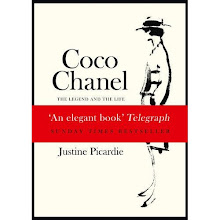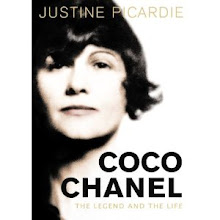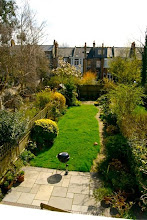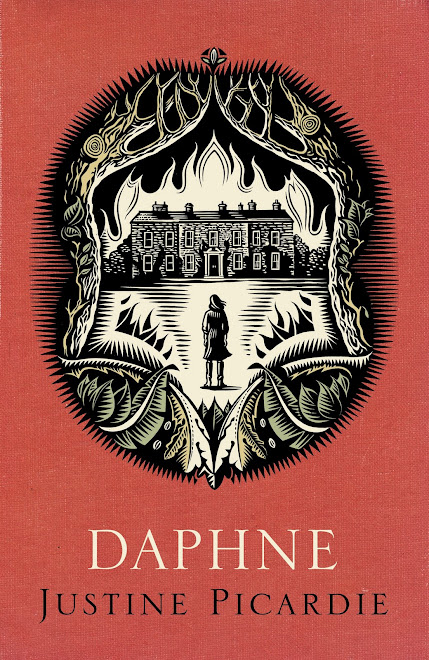




Those of you who followed Elspeth Thompson's wonderful blog, books and garden writing in the Sunday Telegraph will be saddened to hear of her untimely death at the age of 48. One of her talents as a writer was her openness, and I am sure that many, many readers will have felt touched by her way with words, by the sense that Elspeth's unique voice had reached out to them. (And for those who haven't yet read her, you might start with her inspiring piece on gardening against the odds).
I first met Elspeth at university, and feel blessed to have known her. When my sister died of breast cancer, Elspeth's kindness and grace were, as always, evident. On the day of Ruth's memorial service, she rose at dawn, and went to buy lavender at New Covent Garden market, so that the scent of my sister's favourite flower would fill the air. Afterwards, I took several of the pots of lavender home with me, and would always think of Elspeth, as well as Ruth, whenever I saw or smelt them. Indeed, Elspeth's gift that day was one of the catalysts for my founding of the Lavender Trust, a charity which I hoped (as I still do) would remain true to the spirit of Ruth, and others like her, who came to understand that the shadow of death could not take away a profound love of life.
Elspeth knew the meaning of loss, of the darkness at the edge of the light; which may be why she was also swift to cherish those who were dear to her, as well as the gardens that were so close to her heart. Her love of her family, and the gardens she created for them, were entwined; her gardening seemed to me to be an act of faith, as well as a testament to her creativity.
Here is one of the poems that she shared with readers of this blog, for Elspeth was as generous with words as she was with seedlings and flowers.
WHO LOVES THE RAIN
By Frances Shaw
“Who loves the rain
And loves his home,
And looks on life with quiet eyes,
Him will I follow through the storm;
And at his hearth-fire keep me warm;
Nor hell nor heaven shall that soul surprise,
Who loves the rain,
And loves his home,
And looks on life with quiet eyes.”
Finally -- well, not finally, because the living continue talking to the dead -- is a poem that Elspeth posted on this blog at the turning of the year. Here it is again, for her, wherever she may go...
TWENTY BLESSINGS
adapted from the Celtic by Thomas A Clark
May the best hour of the day be yours.
May luck go with you from hill to sea.
May you stand against the prevailing wind.
May no forest intimidate you.
May you look out from your own eyes.
May near and far attend you.
May you bathe your face in the sun’s rays.
May you have milk, cream, substance.
May your actions be effective.
May your thoughts be affective.
May you will both the wild and the mild.
May you sing the lark from the sky.
May you place yourself in circumstance.
May you be surrounded by goldfinches.
May you pause among alders.
May your desire be infinite.
May what you touch be touched.
May the company be less for your leaving.
May you walk alone beneath the stars.
May your embers still glow in the morning.
So, no, not finally, never that, two more poems and comments from Elspeth. When I wrote exactly a year ago on what to read when the clocks go forward, she sent me two poems by Mary Oliver, including the one that was read at my sister's funeral. As she said to me then, it represented a kind of full circle. Dear Elspeth, dearest Elspeth, thank you for remembering the poems. We will remember you.
WILD GEESE
BY MARY OLIVER
You do not have to be good.
You do not have to walk on your knees
for a hundred miles through the desert repenting.
You only have to let the soft animal of your body
love what it loves.
Tell me about despair, yours, and I will tell you mine.
Meanwhile the world goes on.
Meanwhile the sun and the clear pebbles of the rain
are moving across the landscapes,
over the prairies and the deep trees,
the mountains and the rivers.
Meanwhile the wild geese, high in the clean blue air,
are heading home again.
Whoever you are, no matter how lonely,
the world offers itself to your imagination,
calls to you like the wild geese, harsh and exciting —
over and over announcing your place
in the family of things.
IN BLACKWATER WOODS
Look, the trees
are turning
their own bodies
into pillars
of light,
are giving off the rich
fragrance of cinnamon
and fulfillment,
the long tapers
of cattails
are bursting and floating away over
the blue shoulders
of the ponds,
and every pond,
no matter what its
name is, is
nameless now.
Every year
everything
I have ever learned
in my lifetime
leads back to this: the fires
and the black river of loss
whose other side
is salvation,
whose meaning
none of us will ever know.
To live in this world
you must be able
to do three things:
to love what is mortal;
to hold it
against your bones knowing
your own life depends on it;
and, when the time comes to let it go,
to let it go.

















